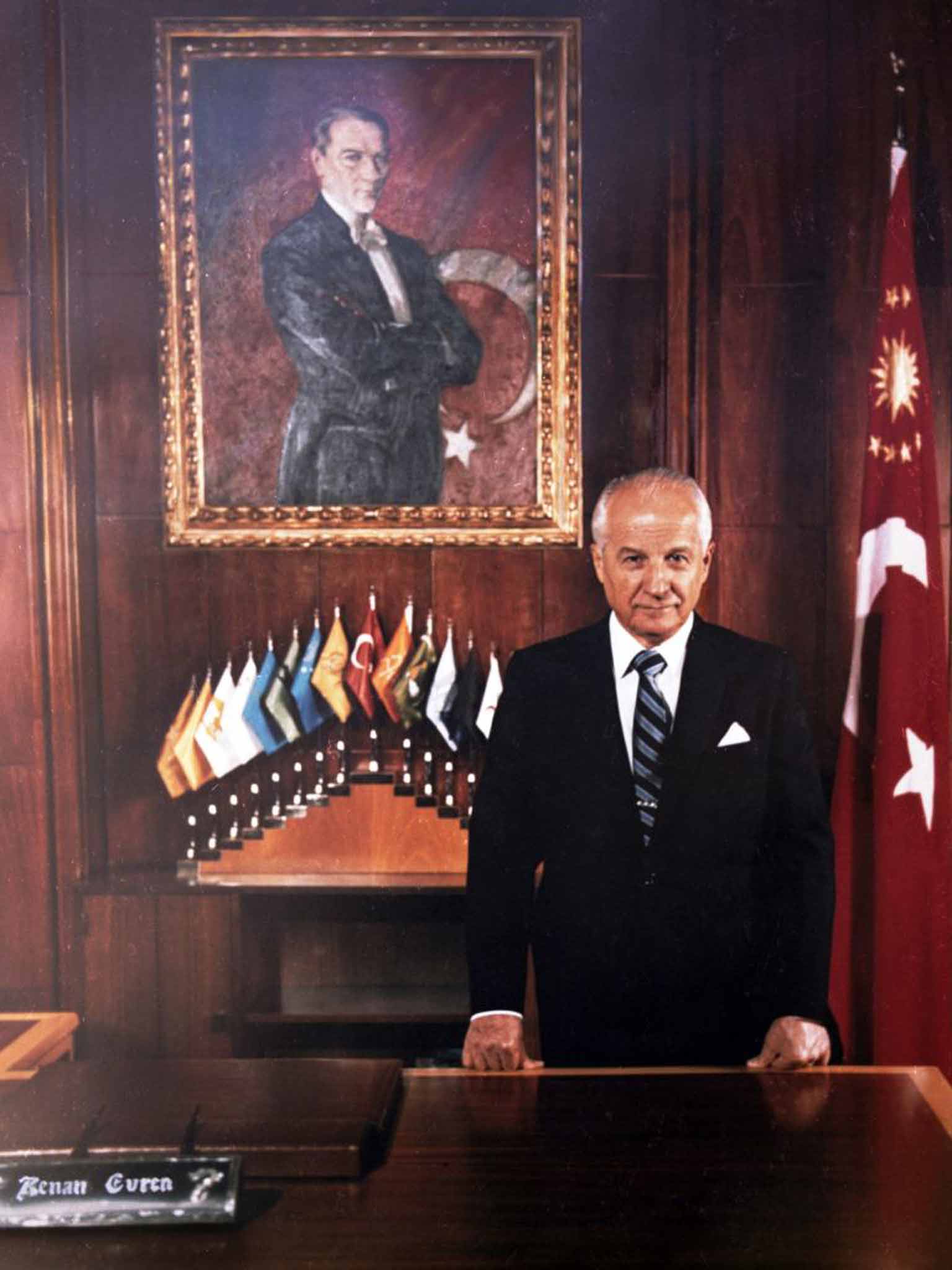Kenan Evren: General who led the 1980 military coup in Turkey that ended years of conflict but resulted in brutal suppression
Evren, alongside the only other surviving member of the 1980 coup, was convicted of crimes against the state in 2015 and sentenced to life imprisonment

Kenan Evren led Turkey's 1980 coup that ended years of clashes between left-wing and right-wing militias. But he also unleashed a wave of arrests, torture and extrajudicial killings.
He was hailed as a hero for ending fighting that had left around 5,000 people dead and put Turkey on the brink of a civil war. But he became one of the country's most controversial figures, remembered more for the torture of former militants and their supporters and for introducing a constitution that restricted freedoms and formalised the military's role in politics. Turkish politicians are still scrambling to replace the constitution he helped institute.
Last year Evren, alongside the only other surviving member of the 1980 coup, was convicted of crimes against the state and sentenced to life imprisonment, the first generals to be tried and convicted of leading a coup in Turkey. The court also demoted him to the rank of private.
The trial was made possible after the government of Recep Tayyip Erdogan secured constitutional amendments in a 2010 referendum in the hope that the showcase trial would help put an end to the military's interventions.
Evren, then head of the Turkish military, sent tanks rolling through the streets of the capital, Ankara, at 4am on 12 September 1980, wresting power from a civilian government that was unable to keep order and dismantling checkpoints manned by rival militias. He shut down Parliament, suspended the constitution, imprisoned civilian leaders and disbanded political parties.
It was the country's third coup since 1960 and was welcomed by most Turks. But around 650,000 people were detained and 230,000 prosecuted in military courts. About 300 people died in prison, including 171 as a result of torture. Celalettin Can, an activist imprisoned during the coup, said: "A whole generation was destroyed. Turkey's future was darkened."
Evren always maintained that torture was not sanctioned by the military, although it was not clear what, if anything, he did to address it. "It may have happened, but neither the government nor the military council gave a directive for torture, torment or oppression," he said in a documentary about the coup. Around 50 were executed, including 17-year-old Erdal Eren, whose hanging for allegedly killing a soldier horrified Turks. Evren was unapologetic.
"So, after I catch them and send them to trial, I will not execute them but look after them for the rest of their lives?" he said in 1984. "I will feed this traitor who kills the soldier that gives his life for the land? Would you accept that?" Turkey abolished the death penalty in 2000 as part of reforms to join the EU.
Evren's five-member military council ruled until November 1983 then handed back power to civilians. Evren left the military but remained in power after ensuring that he was elected president for seven years in a 1982 referendum which also approved a new constitution that restricted unions and freedom of association, put universities – scenes of violence in the 1970s – under strict state control and muzzled freedom of expression.
It gave the military political influence through the National Security Council, a forum of generals and political leaders that still meets every two months. A clause ensured that no criminal charges could be brought against the coup leaders.
Evren defended the constitution, saying it was designed to avoid mistakes that led to the civil strife of the 1970s. He set parliamentary elections for 1983 but only allowed three parties with carefully vetted leaders to run; former leaders such as Suleyman Demirel, who was ousted by the coup and former premier Bulent Ecevit, were barred.
On the eve of the elections in 1983, Evren all but told voters to cast their ballot in favour of a retired general who headed one of the three parties running. That backfired and Turgut Ozal, a liberal whom Evren had put in charge of the economy, was elected prime minister after winning an overwhelming majority, and ushered in an era of economic liberalism. To Evren's dismay another referendum, in 1987, lifted the ban on old politicians, and both Demirel and Ecevit returned to politics.
In 2010, on the 30th anniversary of Evren's takeover, Turks voted in a referendum to a series of amendments to the constitution, lifting the coup leaders' immunity from prosecution. Human rights activists rushed to petition courts for Evren's prosecution the next day.
The trial against Evren and former Air Force Commander Tahsin Sahinkaya opened in April 2012. Evren refused to answer prosecutors' questions, maintaining that the court had no right to put him on trial, but made a brief statement saying the military was forced to intervene and introduce a "new constitutional order to bring peace and calm ... "The great Turkish nation did not deserve to live through the [pre-coup] events. We did what was right at the time and if it happened today we would carry out a military coup again."
Evren was born in Alasehir, western Turkey, the son of emigrants from the Balkans. He graduated from the country's war college in 1938, and fought in the Korean War. He was promoted to general in 1964 and appointed Chief of Military Staff in 1978.
Kenan Evren, soldier and politician: born Alasehir, Turkey 17 July 1917; married 1944 Sekine (died 1982; three daughters); died Ankara 9 May 2015.
Join our commenting forum
Join thought-provoking conversations, follow other Independent readers and see their replies
Comments